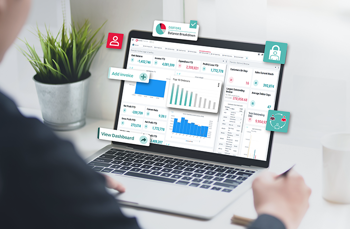Best accounting software for medium-sized businesses in 2025
What is the best accounting software for medium-sized businesses? With so many accounting systems in the market, offering similar features and benefits, how do you pick the right one for your business?
Purchasing new accounting software is a big decision. As a medium-sized business, you need to be sure that the new accounting system is future-proofed for your growth.
We discuss below what the best accounting software is for medium businesses, what makes accounting software future-proof, and when you should upgrade your accounting software.
Information on this page
When should you upgrade your business accounting software?
So when is it time to upgrade? Perhaps the solution that suited your needs as a start-up or small business is now too simplistic. You could be missing out on tools that may facilitate further growth.
Perhaps your business is expanding in other ways? New capabilities and markets have created a need for greater functionality.
Or it could be that you’re restricted by a clunky on-premise solution and looking to move to a more efficient, more secure cloud-hosted platform.
4 signs you’ve outgrown your accounting software
It can be easy to miss, but there are often subtle signs that indicate you've outgrown your current business accounting software. Some of these include:
1. Your existing system isn’t integrated with the rest of the business
You’re probably using a range of different systems across different functions. The best business accounting software will integrate with them all. Collecting data from across the organisation enables faster, better-informed decisions. Moving away from siloed systems also means less time spent on workarounds and manual data input.
2. You’ve yet to upgrade to a reliable cloud solution
If you’re still relying on on-premise accounting software you’re missing out on several big benefits. Moving to a cloud-based accounting system will provide easy, remote access to live data, improved security, instant upgrades and better user experience.
3. There’s a lack of automation of your finance processes
A lack of automated processes is another one of the signs you’ve outgrown your accounting software. Manually rekeying data increases the potential for errors. Your reports could even be based on outdated or inaccurate information. It also means your team will spend too much time on repetitive, low-value tasks when they could be working on more strategic activities.
4. You need to step up security and data protection
An outdated system requires extra intervention to meet UK compliance rules. The older your accounting software, the more time hackers have had to work out how to undermine it. Cloud accounting software offers enterprise-level security with compliance and data-recovery tools built in. After all, no one wants to leave their business digital records vulnerable to data breaches and theft.
How to Build a Requirements Document for your new finance software?
What’s the best accounting software for medium-sized businesses?
Medium-sized businesses are defined as having a turnover of between £25m and £500m. Obviously, it’s a broad range. A business at one end of the spectrum will have very different financial processing requirements to one at the other. Regardless of your turnover now, all medium-sized businesses need the ability to scale. For that, you need the best accounting software that meets your current and future needs.
There are many providers in the market offering accounting systems such as us (The Access Group), QuickBooks, Xero and Sage. But which one is best for medium-sized businesses? Let's take a look.
QuickBooks Online
Online accounting software QuickBooks comes with a low-cost starter plan and relative simplicity. This entry-level, small-business accounting software is great for freelancers and sole traders who don’t need advanced reporting or accounting. As customers, products, revenues and sales channels increase, you'll require additional functionality.
With time, you might find information stored in separate spreadsheets. This means more time collating data as well as limiting visibility and reporting capabilities. You might need more user licenses, or feel frustrated by the lack of customisation options.
Xero
Similarly, Xero is aimed at the smaller end of the SME spectrum. So you might be limited by some of the functionality, particularly around multiple currencies, Outlook integration and inventory management. Or it might simply start slowing down: Xero has recommended limits on sales invoices (1,000 per month), purchase bills (1,000) and tracked inventory items (4,000). Exceed these, and your system won’t be able to perform in the way it’s designed to.
Sage 50
Sage 50 is also designed for small businesses. With Sage, you get a 30-day free trial to explore its features. This includes general ledger, accounts payable and receivable, inventory management, and payroll processing. Sage 50 is known for its ease of use and affordability, making it a popular choice for sole traders, small business owners and businesses just starting out.
/While you can find manual workarounds and complementary software, this approach isn’t sustainable. It will put an extra burden on your system and finance team. An accounting software solution designed for your medium business will offer more advanced tools and reporting. That means better alignment with your organisation’s requirements. So which accounting software can give you this?
Access Financials
Access Financials is designed for medium-sized businesses. As your organisation grows, you need a connected financial system that can keep pace. As one of the UK’s fastest-growing software businesses, Access understands the dynamics of expansion. Our cloud-based accounting software, Access Financials, supports the complex needs of medium-sized businesses and not-for-profit organisations.
Our solution provides everything you need to streamline and automate complex accounting processes. This way, you can eliminate duplication, improve controls, and enhance visibility. It also offers several advantages over Sage 50 and Xero, including:
- Unlimited transactions
- Month-end management
- Multi-level general ledger
- Auditing and corrections
- Automated bank reconciliation
- Customisable analytics
- Resource scheduling
Take a look at the feature comparisons between The Access Group, Sage 50 and Xero here.
What makes accounting software future-proof?
If you want to know whether your accounting software will be just as useful to you in five years’ time as it is now, consider:
- Will it give the business room to grow?
Consider limits on the number of users, as well as on the number of transactions, API calls, and tracked inventory items. As your business expands and becomes more complex, you might need to add on more advanced functionality, such as multi-company, multi-currency accounting and multi-dimensional reporting.
- Will it stay up to date?
A huge benefit of cloud-based accounting systems is that software and security are upgraded automatically. You always have access to the latest features and your data and systems are always properly protected. Compliance should be built in and evolve in response to rule changes, so you’ll always meet the latest UK regulations.
- Will it be useful beyond the finance department?
Good accounting software won’t just make the finance team’s jobs easier. Ideally, it will integrate with other systems to promote efficiencies across the organisation. The ultimate goal is to generate insightful management reports to inform decision-making.
Our easy-to-use Workspace apps make it easy to share key data and insights with the rest of your business. They also allow team members to input financial data, action approvals and view reports, reducing data entry and bottlenecks.
- Will it give an instant view of financial performance?
The ideal system has a centralised data dashboard that captures what’s happening across all strands and systems within the business and presents it in a readable, precise manner.
This becomes harder in more complicated businesses with a number of subsidiaries. Access software helps you manage multi-company, multi-currency accounts like multiple revenue sources for sports clubs or venues, and group-level consolidation with ease.
But don't just take our word for it! Mike Ramsden, Technology Director at Matrix Control Solutions says:
We’re now 100% happy with running our own system. Our goal to strengthen and develop our operational performance through enhanced processes has successfully been achieved whilst setting the business up to handle further growth.
Key Takeaways
In the end, he best business accounting software for medium-sized enterprises is the one that accommodates growth and helps you achieve it.
The cost of accounting software is another topic, but it’s worth remembering the ROI too. The right software will add value to your business. It will save time for your team, help you avoid costly errors and potentially reduce the need for outsourcing.
More than that, consolidated financial reporting can provide the real-time data you need to plot your business’s next big move.
We’re happy to help you determine which accounting software is best for you, even if you decide your path doesn’t include us. Contact us or book a demo today and let’s see what is going to work best for your organisation.
Once you've chosen your finance software, you're likely going to be switching from your current system to your new one. Our switching hub has many resources to guide you through this process.
More accounting software information, guidance and advice

Cloud vs on-premise accounting software: How do they compare?
Go to article
What is a financial management system?
Go to article
How much does accounting software cost?
Go to article
How does accounting software work?
Go to article
How to choose the right accounting software
Go to article